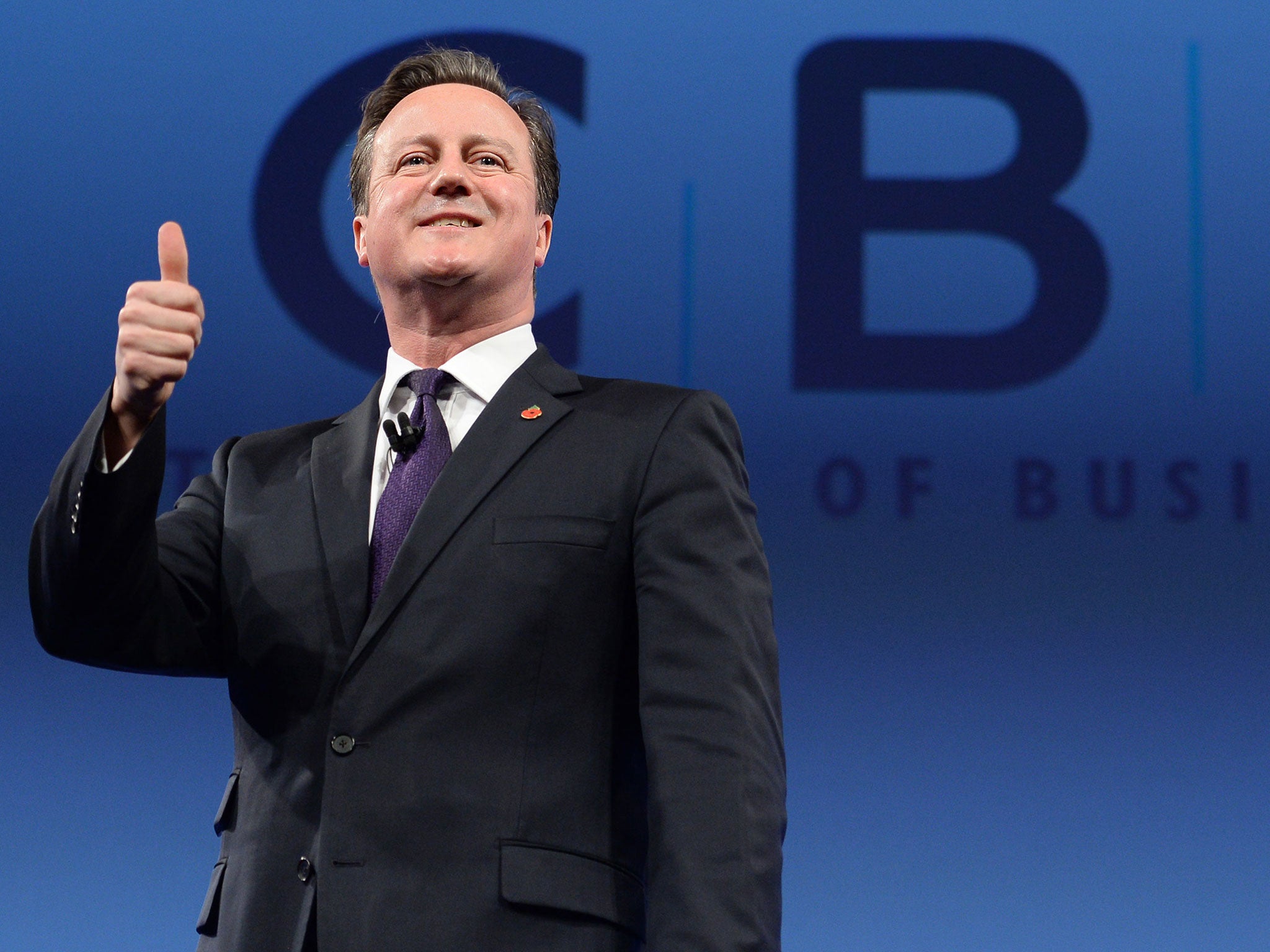CBI asks David Cameron to dial down anti-EU rhetoric
Party leaders address business leaders at their annual conference

Business leaders have asked David Cameron to tone down Conservative “rhetoric” on the European Union, and declared that continued membership would be good for the British economy.
Speaking to the CBI’s annual conference in London, the Prime Minister criticised Ed Miliband and Nick Clegg for saying they would keep Britain in the EU “come what may”. All three leaders addressed the conference in a “beauty parade” aimed at wooing business ahead of next May’s general election.
Mr Cameron dismissed bosses’ fears that his pledge of an in/out referendum in 2017 was deterring foreign investment in the UK.
“The worst thing for us to do as a country is to pretend this European debate isn’t happening,” he said.
But Sir Michael Rake, the CBI's president, told the conference that UK membership of a reformed EU “is overwhelmingly in our national interest.”
He warned that Britain faced a stark choice of two futures: “looking inward, shutting ourselves off from the world” or embracing openness. He urged Mr Cameron to seek reforms to benefit the whole of the EU - “not just a special deal for Britain”.
Sir Michael acknowledged public concern about immigration but insisted it brought a net boost to the economy.
“Immigration has been and is part of the solution to the skills shortages faced by the UK,” he said.
Mr Cameron was heard with polite respect and touched the right buttons by promising to keep corporation tax low and to boost infrastructure projects. But in the margins, business figures expressed concern he is was risking Britain’s accidental exit from the EU.
“His heart is in the right place on Europe but his head is telling him to appease his backbenchers and chase Ukip,” one said.
Such doubts gave Mr Miliband an opening and he took it. Business is worried about Labour’s plans to intervene in the economy by freezing energy prices, break up the banks and impose an £8-an-hour national minimum wage by 2020. Mr Miliband also faced questions about Labour’s plans to bring back the 50p top rate of tax, and institute a mansion tax on homes worth more than £2m – both subjects close to the heart of well-paid bosses.
But the Labour leader was on safe ground on Europe, accusing Mr Cameron of “pandering” and “posturing” and promising he would “never risk British businesses, British jobs, [or] British prosperity by playing political games with our membership of the EU”.
He also promised “dialogue” with business but made clear he would not be deflected from his plans to recast the economy.
Unlike Mr Cameron and Mr Clegg, who spoke off the cuff from the front of the platform, Mr Miliband positioned himself behind a podium and spoke from notes – in sharp contrast with his disastrous party conference speech in September in which he forgot to mention the deficit.
The Labour leader cracked a few well-received jokes, unlike his two rivals. He won some unexpected sympathy from some CBI delegates, who booed ITV News when it gatecrashed their question and answer session and asked Mr Miliband if there was a “crisis of confidence” about him inside his own party following rumours of a plot to oust him.
“No,” he replied tersely.
Mr Miliband also managed to laugh at himself. He recalled CBI leaders telling him not to believe everything he read in the newspapers. “It won’t surprise you to know that I rather agree with that just at the moment,” he said. Did he ever wish his brother David had beaten him to the job? “Definitely not. It is a huge privilege doing this job,” he replied.
Mr Clegg was heard with respect and CBI delegates acknowledged the Liberal Democrats’ role in cutting the deficit. But some business representatives reacted coolly to his pitch that both Labour or the Tories were both unfit to govern alone after the election.
“Wrong audience,” said one. “This was pure self-interest. Business likes certainty and doesn’t want another hung parliament.”
Subscribe to Independent Premium to bookmark this article
Want to bookmark your favourite articles and stories to read or reference later? Start your Independent Premium subscription today.

Join our commenting forum
Join thought-provoking conversations, follow other Independent readers and see their replies